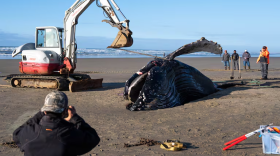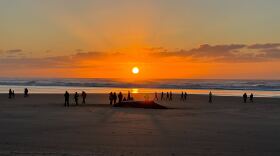It felt like everyone in Oregon was watching and worrying after a young humpback whale was stranded Saturday on a beach north of Yachats. The whale was entangled in crabbing gear.
The whale was euthanized on Monday.
Jim Rice is the Stranding Program Manager with the Marine Mammal Institute at Oregon State University. KLCC’s Rachael McDonald asked him to describe what happened.
Jim Rice: It's a very tall order to try to rescue a live whale off the beach. And when this animal was first reported, it was not in fact on the beach, it was still in the surf, some 100 a few 100 yards offshore. A few hours later, it became apparent that the whale was in fact on the beach.
By that time it was dark. We did have people who work as affiliates of the straining network. They work in some capacity with Oregon State University. They're scientists. They are whale experts. They happened to be able to get eyes on the whale to identify it, to see that it had been entangled. But lacking the logistical necessities that would be required to move an 8-ton animal safely off the beach, those resources, that ability, that technology, frankly, simply doesn't exist.
I understand that there were statements made on social media, making calls out for volunteers to come to Yachats to help rescue the whale, asking people to bring wetsuits, to be prepared to go into the water to push this animal back into the water. And I want to stress that that is something we would never condone. The NOAA fisheries that oversees stranding networks nationwide would never condone putting people into the water with a live whale. It's extremely dangerous. People have died trying to do that.
So, we're confronted with a harsh reality here. There's a live whale on the beach that has a very slim chance of surviving. As hard as that is to say or to see or to witness, that is a simple fact, and we can't wave a magic wand and make things change instantly. It's just an impossible situation, unfortunately.

Rachael McDonald: It sounds like there was a lot of public criticism of the response from officials, having to do with how long it took for people to get there and the effort that was done.
Rice: There may be an assumption that we operate like a fire department and we are geared up and ready to roll as soon as the bell rings. And unfortunately that's not the case. We are a patchwork of people from lots of different organizations throughout the Pacific Northwest.
We are not a concentrated unit that is geared up and ready to roll at a moment's notice.
Most strandings that occur in Oregon are not live whale strandings.
These are extremely rare events. Most of the work I do is to document mortalities of animals when they come ashore, or animals that are close to dying and, frankly, are not likely to survive. Usually it's due to illness.
So I deal mostly with seals and sea lions, and it's something that does not involve huge armies of people and logistical challenges that can't be met quickly and easily. Large whale strandings are an anomaly. They are, you know, sort of like a category 5 hurricane affecting a community that just is not ready to handle something like that.
It’s an out of the ordinary situation that we can certainly learn from and try to improve upon and develop greater capacity going forward. But it's not something any network that I'm aware of in the United States has the capacity to do, the way many people would hope and expect it should be done.
McDonald: You have this opportunity to talk to folks and, and tell them, what should people do if they come across a whale or whether it's a whale or a seal or a sea lion?
Rice: The best thing they can do is report it. Give us the information that they have, and please be patient and understanding. And don't try to take matters into your own hands.
These are very dangerous situations. I know a lot of people have a very benevolent view of whales, and they view them as creatures that they have a kinship to and an animal that would appreciate our help.
But these are wild animals, and they do not necessarily see humans as their saviors, and they will react in ways that can be violent and can be life threatening to people. So, for human safety's sake, we ask people not to take matters into their own hands, please, but to report things as quickly as possible so that we can then respond as quickly as we can.





